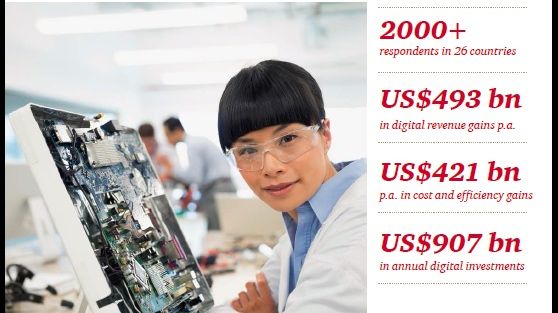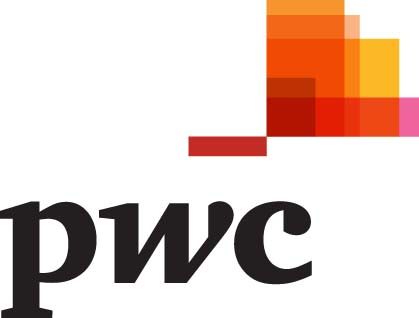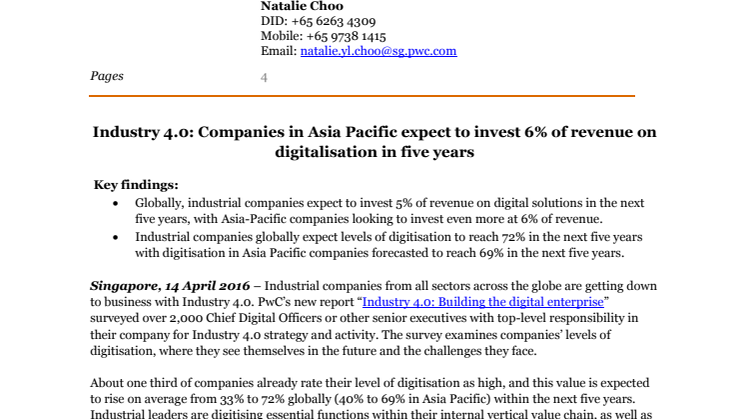
Press release -
Industry 4.0: Companies in Asia Pacific expect to invest 6% of revenue on digitalisation in five years
| Date | 14 April 2016 |
|
Contact |
Candy Li Tel: +65 6236 7429 Mobile: +65 8613 8820 E-mail: candy.yt.li@sg.pwc.com Natalie Choo Tel: +65 6236 4309 Mobile: +65 9738 1415 E-mail: natalie.yl.choo@sg.pwc.com |
Industry 4.0: Companies in Asia Pacific expect to invest 6% of revenue on digitalisation in five years
Key findings:
- Globally, industrial companies expect to invest 5% of revenue on digital solutions in the next five years, with Asia-Pacific companies looking to invest even more at 6% of revenue.
- Industrial companies globally expect levels of digitisation to reach 72% in the next five years with digitisation in Asia Pacific companies forecasted to reach 69% in the next five years.
Singapore, 14 April 2016– Industrial companies from all sectors across the globe are getting down to business with Industry 4.0. PwC’s new report “Industry 4.0: Building the digital enterprise” surveyed over 2,000 Chief Digital Officers or other senior executives with top-level responsibility in their company for Industry 4.0 strategy and activity. The survey examines companies’ levels of digitisation, where they see themselves in the future and the challenges they face.
About one third of companies already rate their level of digitisation as high, and this value is expected to rise on average from 33% to 72% globally (40% to 69% in Asia Pacific) within the next five years. Industrial leaders are digitising essential functions within their internal vertical value chain, as well as with their horizontal partners along the supply chain. In addition, they are enhancing their product portfolio with digital functionalities and introducing innovative, data based services. Companies worldwide want to invest approximately 5% of their turnover annually on digitisation. In Asia Pacific, respondents indicated spend of approximately 5% of their annual revenue over the last two years and this is set to increase to 6% in the next five years.
Based on the survey, globally 5% of turnover corresponds to a total investment of $US 907 billion. A major focus of these investments will be on digital technologies like sensors or connectivity devices, and on software and applications like manufacturing execution systems. In addition, companies are investing in training employees and driving required organisational change. More than half of these companies (55% globally, 58% in Asia Pacific) assume they will amortise this expenditure within just two years.
In the course of this transition, the managers surveyed globally estimate a cost reduction of on average 3.6% per year and an additional revenue of on average 2.9% annually. In absolute terms, this corresponds to a total of $US 914 billion, which is made up of $US 421 billion in cost savings and a simultaneous increase in turnover of $US 493 billion.
“Companies expect digitisation to deliver huge benefits and are investing correspondingly large amounts. Our study shows that this transition is taking place in all the countries surveyed in equal measure, not only in industrialised countries. Even if only half of the expectations associated with Industry 4.0 are fulfilled, it will fundamentally change the competitive environment in the coming five years,” says Ong Whee Teck, Technology Consulting Partner, PwC South East Asian Consulting.
At the end of this transformation process, successful industrial companies will become truly digital enterprises, with physical products at the core, augmented by digital interfaces and data-based, innovative services. These digital enterprises will work together with customers and suppliers in industrial digital ecosystems.
Data analytics is the driver for Industry 4.0
Over 80% of companies globally (82% in Asia-Pacific) expect data analytics will have a significant influence on their decision-making processes in five years’ time. “Preparing and analysing meaningful data professionally provides a valuable insight into the use of products and makes a long-term customer relationship possible,” says Greg Unsworth, Digital Business Leader, PwC Singapore. “Data analytics enables products enhancement and companies to add to services and offers aligned precisely with the needs of customers and clients.”
Lack of expertise: a barrier on the way to Industry 4.0
The companies surveyed see the problems in implementing Industry 4.0 less in acquiring the necessary technology, but more in the lack of internal digital culture, vision and training, as well as in a lack of specialists. For example, almost 40% of the companies surveyed globally and 29% in Asia-Pacific rely on the analytics expertise of individual employees, but do not have dedicated data analytics departments. “It is prudent to build up sound expertise in data analytics and digitisation in one’s own company. The use of individual experts in collecting and evaluating data is not sufficient to implement Industry 4.0 strategies successfully,” says Greg Unsworth, Digital Business Leader, PwC Singapore. “To be able to use them as a basis for decision-making, companies require data pools, algorithms and actionable recommendations prepared professionally.”
The study outlines a further pre-requisite for successful digitisation in the provision of data security. “Digital ecosystems can only function if all participants can rely on the fact that their data will not fall into the wrong hands. This requires considerable effort from companies, substantial investment in the security of their systems and clear standards for protecting their data,” says Ong Whee Teck, Technology Consulting Partner, PwC South East Asian Consulting.
Digitisation impacts horizontally and vertically along the value chain. This means that on the one hand, companies need to better integrate processes and digitise their data flow vertically, from product development and procurement all the way to manufacturing and transport logistics. On the other hand, it means horizontal networking with key suppliers, customers and other partners in the value chain, e.g. by using track and trace solutions to follow product flows. For companies this means creating complex digital solutions.
In addition, companies are developing new products and services with digital features, which span the entire product life cycle and therefore enable closer contact to end consumers. They also invest in digital services and create complete solutions for their customer’s relevant ecosystem, often in collaboration with value chain partners.
The objectives of digitisation differ from country to country
Although companies worldwide are pressing ahead with Industry 4.0, the study shows regional emphases in their objectives: corporate groups in Japan or Germany are using digitisation above all to increase their efficiency and product quality. In the United States, the tendency is emerging to develop new business models with the aid of digital offers and services, and to provide these products and services digitally as quickly as possible. Industrial companies in China are focusing on holding up better against international competitors by reducing costs. “Our study shows that the level of digital integration will be broadly comparable in the regions in five years, with some countries like Japan, Germany or the US at the forefront. Instead of dividing the regions, we expect Industry 4.0 to bind companies and countries together more tightly and therefore even promote globalisation,” says Ong Whee Teck, Technology Consulting Partner, PwC South East Asian Consulting.
Companies in Asia-Pacific expect high digitisation in five years
Of the companies surveyed within Asia Pacific, 40% of companies currently rate their level of digitisation as high. This value is expected to rise to 69% within the coming five years, indicating that Industry 4.0 has firmly arrived at the operational core of industrial companies and will drive a substantial digital transformation of all industries. When applying Industry 4.0 solutions, Asia Pacific respondents reflected that they plan to use big data to optimise overall business planning and controlling.
In alignment with the global trend, development is gathering speed as far as willingness to invest is concerned: Companies in Asia Pacific spend 5% of their annual turnover on Industry 4.0 projects; meanwhile, according to the results of the current 2016 study, this is forecasted to reach 6% in five years.
There is still need for action regarding the maturity level of data analytics in Asia Pacific. Survey results show only 19% consider their business to be advanced, 51% assume an intermediate level of development, and 19% perceive distinct shortcomings. 11% outsource these tasks to external specialists.
“Companies in Asia-Pacific tend to be in less mature stages of their life-cycle. This gives them the opportunity to overtake firms in more mature markets as they can implement new digital solutions with less concern for legacy systems. Although these firms are at an advantage, it is important that security is not compromised during the implementation of these systems,” says Ong Whee Teck, Technology Consulting Partner, PwC South East Asian Consulting.
Greg Unsworth, Digital Business Leader, PwC Singapore concludes, “Here in Singapore, we see that companies have not fully adopted a digital culture and are unclear of the benefits they can provide. As companies strive to integrate more digital solutions, decision-makers must be able to leverage technological capabilities to solve business problems or risk being left behind.”
ENDS
Notes to editors:
What is Industry 4.0?
While Industry 3.0 focused on the automation of single machines and processes, Industry 4.0 focuses on the end-to-end digitisation of all physical assets and integration into digital ecosystems with value chain partners. Generating, analysing and communicating data seamlessly underpins the gains promised by Industry 4.0.
About the survey
The PwC Global Industry 4.0 Survey is based on research conducted between November 2015 and January 2016 with over 2,000 senior executives from industrial products companies in 26 countries across Europe, the Americas, Asia Pacific, Middle East and Africa.
The majority of participants were Chief Digital Officers or other senior executives with top-level responsibility in their company for Industry 4.0 strategy and activity. Results were weighted by country GDP to provide a balanced view in global totals.
For further information and the whole report, please go to: pwc.com/industry4.0
Methodology
Based on research conducted between November 2015 and January 2016 with over 2,000 senior executives from industrial products companies in 26 countries. The majority of participants were Chief Digital Officers or other senior executives with top-level responsibility in their company for Industry 4.0 strategy and activity. Results were weighted by country GDP to provide a balanced view in global results.
Related links
Topics
Categories
About PwC
At PwC, our purpose is to build trust in society and solve important problems. We’re a network of firms in 157 countries with more than 208,000 people who are committed to delivering quality in assurance, advisory and tax services. Find out more and tell us what matters to you by visiting us at www.pwc.com.
PwC refers to the PwC network and/or one or more of its member firms, each of which is a separate legal entity. Please see www.pwc.com/structure for further details.
© 2016 PwC. All rights reserved



